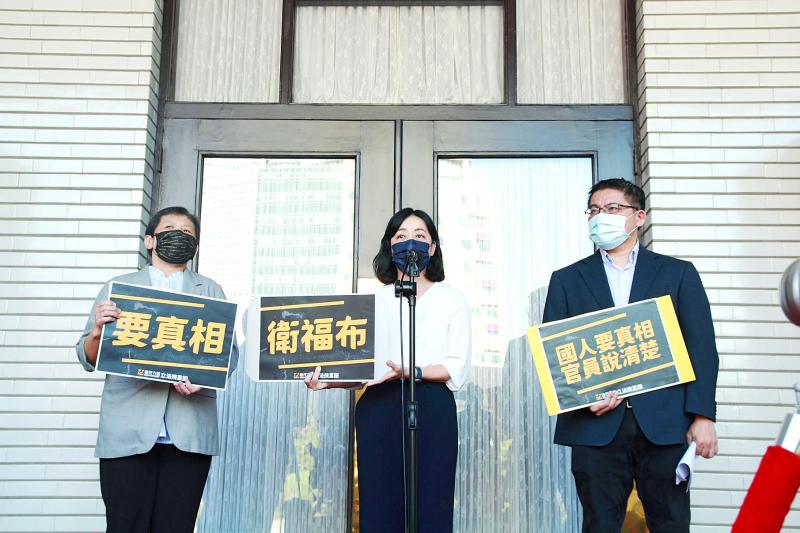The Executive Yuan should investigate the procedures that led to relaxed quarantine rules for aircrew members earlier this year, as key information remain missing in an investigative report released last week, the New Power Party (NPP) legislative caucus said yesterday.
Following requests from all legislative caucuses, the Cabinet in June launched an investigation into procedures that led to the implementation of the so-called “three-plus-11” disease prevention policy, which required aircrew members to quarantine for three days and observe their health for another 11 upon entering Taiwan.
The regulation is suspected to have led to a domestic outbreak of COVID-19 with nearly 15,000 cases and 800 deaths since May.

Photo: Yang Cheng-yu, Taipei Times
However, the 12-page investigative report, which was unveiled at a plenary session on Friday last week, did not appease opposition lawmakers.
“I was stunned when I received the report last week, because it did not include the minutes of meetings on April 9 and 13, in which the three-plus-11 policy was finalized,” NPP Chairwoman and deputy caucus whip Chen Jiau-hua (陳椒華) said ahead of yesterday’s session, adding that she would request further investigation.
NPP Legislator Claire Wang (王婉諭) said that the report contains information that is different from previously disclosed information by the Executive Yuan and Minister of Health and Welfare Chen Shih-chung (陳時中), who heads the Central Epidemic Command Center.
Chen presided over the meetings, Wang said, adding that the scientific data that were presented to the panel and on which it based its decision were vague.
“The government is obligated to explain to the public the basis of its decision, so Taiwan can implement a clear and science-based disease prevention policy,” the NPP said.
The party also urged the Ministry of Health and Welfare to quickly administer two doses of a COVID-19 vaccine to middle-aged and elderly people, citing the suggestions of public health experts.

Eight restaurants in Taiwan yesterday secured a one-star rating from the Michelin Guide Taiwan for the first time, while three one-star restaurants from last year’s edition were promoted to two stars. Forty-three restaurants were awarded one star this year, including 34 in Taipei, five in Taichung and four in Kaohsiung. Hosu (好嶼), Chuan Ya (川雅), Sushi Kajin (鮨嘉仁), aMaze (心宴), La Vie by Thomas Buhner, Yuan Yi (元一) and Frassi in Taipei and Front House (方蒔) in Kaohsiung received a one-star rating for the first time. Hosu is known for innovative Taiwanese dishes, while Chuan Ya serves Sichuan cuisine and aMaze specializes

STATS: Taiwan’s average life expectancy of 80.77 years was lower than that of Japan, Singapore and South Korea, but higher than in China, Malaysia and Indonesia Taiwan’s average life expectancy last year increased to 80.77 years, but was still not back to its pre-COVID-19 pandemic peak of 81.32 years in 2020, the Ministry of the Interior said yesterday. The average life expectancy last year increased the 0.54 years from 2023, the ministry said in a statement. For men and women, the average life expectancy last year was 77.42 years and 84.30 years respectively, up 0.48 years and 0.56 years from the previous year. Taiwan’s average life expectancy peaked at 81.32 years in 2020, as the nation was relatively unaffected by the pandemic that year. The metric

Taitung County is to launch charter flights to Malaysia at the end of this year, after setting up flights to Vietnam and Thailand, the Taitung County Government said yesterday. The new charter flight services, provided by low-cost carrier Batik Air Malaysia, would be part of five-day tour packages for visits to Taitung County or Malaysia. The Batik Air charter flight, with about 200 seats, would take Malaysian tourists to Taitung on Dec. 30 and then at 12:35pm return to Kuala Lumpur with Taiwanese tourists. Another charter flight would bring the Taiwanese home on Jan. 3 next year, arriving at 5:30pm, before taking the

Taiwan High Speed Rail Corp. (THSRC) plans to ease strained capacity during peak hours by introducing new fare rules restricting passengers traveling without reserved seats in 2026, company Chairman Shih Che (史哲) said Wednesday. THSRC needs to tackle its capacity issue because there have been several occasions where passengers holding tickets with reserved seats did not make it onto their train in stations packed with individuals traveling without a reserved seat, Shih told reporters in a joint interview in Taipei. Non-reserved seats allow travelers maximum flexibility, but it has led to issues relating to quality of service and safety concerns, especially during